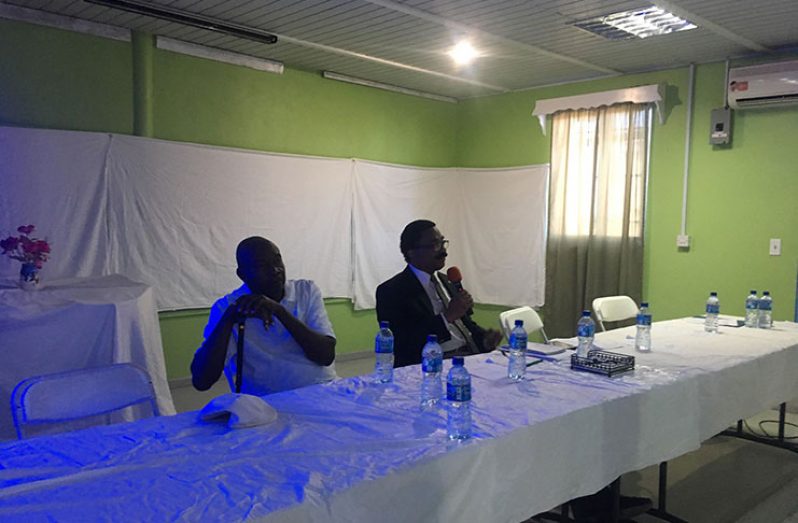ATTORNEY General and Minister of Legal Affairs Basil Williams on Thursday last led a task force to the Corentyne as he continues on a series of Anti-Money Laundering and Combating the Financing of Terrorism (AML/CFT) outreach and sensitisation seminars across the country.
Williams, who is also chairman of the Caribbean Financial Action Task Force (CFTAF), called upon all stakeholders present at the Tej Mohall Hotel in Corriverton to be diligent in their duties as Guyana pushes ahead into the fourth round of evaluations to become compliant with the FATF regulations.
He noted that when the government took office in 2015, the main aim was to get Guyana off the blacklist to ensure citizens conduct their financial transactions with ease and for Guyana to become more investor-friendly.
In explaining the hard road to getting out of the third round and into the fourth, the minster of legal affairs noted that being blacklisted made it difficult for legitimate businesses to be competitive and even forced some businesses to close their doors. However, due to commitment by President Granger to fix the situation, great strides were made, Williams said.
“We were able to achieve all this because the President himself from the onset has given a high-level political commitment to the FATF chairman that Guyana will work with FATF and CFATF to ensure we implement the recommendations of their control bodies,” the attorney general said.
He continued, that Guyana does not want to be found wanting come 2021 when the evaluations for the fourth round is scheduled and be forced to go back into the third round, as some Caribbean countries were forced to do.
To this end, he formed a multi-stakeholder team inclusive of the Financial Intelligence Unit (FIU), Special Organised Crime Unit (SOCU), a team from the Director of Public Prosecutions (DPP) and the Bank of Guyana and has embarked on a series of outreaches and seminars across Guyana to ensure that all the relevant stakeholders are aware of their roles and responsibilities and are compliant with the regulations of the CFATF of which Guyana is a member.
While noting that CFATF which is a multi-member body will assist by doing continuous evaluations leading up to the 2021 evaluations, the need to understand their respective roles and responsibilities is paramount, as that is really what the evaluation is about, the attorney general said.
“We cannot have a successful fourth round unless all of these entities are shown to be technically compliant– that is, they have complied with the legislative framework and regulations that were put in place in the third round and that they are working effectively,” he said.
LAW-ABIDING NATION
Williams continued, that despite what had happened in the past, the government’s goal is to make the country a law-abiding and respectable nation.
“If we fail, we will be sanctioned and banks will withdraw services, making it more difficult to conduct business; we are in the fourth round and as far as I’m concerned, it is a more arduous regime,” he said.
Meanwhile, Director of the FIU, Matthew Langevine, in his presentation underscored the need for stakeholders to understand what is required quickly, since the fourth round, which even though scheduled for 2021, can move forward.
“The fourth round was scheduled for 2022, but moved forward to 2021 and the possibility exists it may move up even further, since the pace for the evaluations have picked up to get more countries to comply quickly with the fourth round. We have a lot of work to be done in the few years remaining, which is why the AG and team are taking it to the people in the various regions to ensure Guyana is in compliance for the fourth round.”
He went on to explain that the mutual evaluation process is where member states allow examiners, either from FATF or World Bank or other FATF-styled regional bodies around the world, to come into the FIU and entire AML/CFT regime on a reciprocal basis of the mutually agreed procedures.
“Basically, the evaluations are observations and test for two things: technical compliance, which was completed in the third round, that is, check legal and institutional framework to make sure the requisite laws and institutions are in place to monitor and curtail illegal activities and are on the lookout; and effectiveness, that is, to look at risk-mitigation systems and effectiveness of the measures that were put in place for the third round. Basically, check up on the laws to see if they are working and persons are being charged, etc,” he said.


.jpg)











